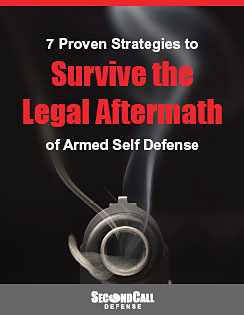Just in Case: The Rationale of Spare Magazines
by Keith Coniglio
Whether it’s because of the inconvenience of yet another item to carry (and conceal), or the old saw, “if I can’t get it done in [insert an arbitrary number of rounds here], more probably won’t help,” many gun owners who carry a defensive firearm “just in case” deride fellow CCW
holders who choose to carry one or even two spare magazines … “just in case.”
The pragmatic focus is usually on how many rounds you may “need” in a defensive shooting, and an FBI statistical figure of 3.7 rounds is often cited. Confusing a calculated average with an ironclad guarantee that you won’t be the statistical outlier, however, could be a fatal error. Just ask Sergeant Timothy Gramins, formerly of the Skokie, IL police department.
In 2009, he was in pursuit of a suspected bank robber, who slammed his vehicle to a halt and bailed out, firing at Sergeant Gramins. Gramins, a “master firearms instructor and a sniper on his department’s Tactical Intervention Unit,” immediately returned fire. In an exchange that lasted less than a minute, the robber fired twenty-one rounds and Gramins fired thirty-three, striking his assailant fourteen times – including six wounds in supposedly “fight-stopping” locations. Except they failed to stop the fight. He was down to four rounds remaining when he was able to make a fatal head shot, ending the gunfight.
There is another, sometimes overlooked reason for carrying spare magazines: mechanical failure. I am a quality assurance engineer – a tester – by trade. It’s my job to not only make sure things work as they should under ideal circumstances, but to probe for weaknesses and envision ways something could fail. And trust me – magazines do fail.
A detachable box magazine is simply that – a box, usually with a removable floorplate, containing a spring under a good amount of pressure. They are simple devices with few parts, but they aren’t impervious to wear. A weakening of the spring or split in the feed lips can cause feed failures. Floorplate failures, while rare (I’ve witnessed only one in the last three decades), will unload your entire magazine in the blink of an eye, scattering loose rounds across the ground. In a defensive encounter, having the ability to immediately eject the now-empty magazine body and replace it with a functioning unit could be the determining factor in the outcome.
Given that you will never know if fate is about to deal you a “Gramins moment” or a mechanical failure, carrying at least one spare magazine is a small choice that can offer major advantages. You know – just in case.
Keith Coniglio is a father, software tester, NRA-certified pistol instructor, and devoted Second Amendment advocate. He is also the editor-in-chief of Descendants of Liberty Press, a site dedicated to rekindling Americans’ passion for – and defense of – their Constitutional rights and personal liberty.

